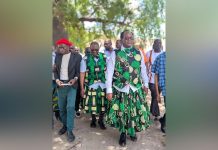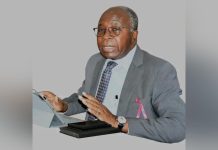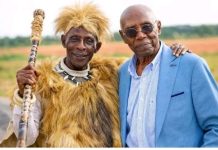
Africa-Press – Zambia. I Write What I Like: The UPND Government Has Prematurely Opened the Tribalism Pandora Box They Can’t Fix Easily. Note from the ZCTRC mandate state that: “The Zambian Citizens Truth and Reconciliation Commission of Inquiry into Tribalism is an initiative in response to the emergence of a polarized tribal pattern in our national life. Through this citizen-owned process, we will arrive at a truthful reconciliation to put this divisive, tribal episode of our national life behind us once and for all in order to preserve national unity, pride and integrity for future generations of Zambians”.
By Daimone Siulapwa While I agree 100% that the PF government victimised a lot of citizens based on a lot of factors, including tribal, I also feel the UPND government should have taken its time to study and understand the damage tribalism has done to our country and the impact of what of will happen if they execute premature redress to the tribal dilemma covering only the PF era.
One way or the other, we all have been affected by tribalism and not only during the PF regime, but since democracy was reintroduced in 1991. For a long time, since around 1996, politicians in Zambia from both spectrums of the divide, “the ruling and the opposition” have been exploiting tribal loyalty to advance party and personal political gain and this where we find ourselves today, at a very dangerous crossroad.
Extreme insanity is a description that can fit the events and activities that have come to define Zambian politics today, particularly in relation to tribal forces that could quickly bring the country to the brink of a halt.
It is evident that the challenge to democracy in Zambia is not the prevalence of ethnic diversity, but the use of identity politics to promote narrow tribal interests, which in every context is tribalism.
And in the absence of candid efforts to build genuine political parties that compete on the basis of philosophies, Zambia has reverted to tribal identities, which are a result of arbitrary post-colonial boundaries that have forced different communities to live within artificial borders.
It is these very ethnic communities that have reinforced ethnic competition and made the country lose focus on building the nation around ideas rather than clan identities. This has caused political leaders to exploit tribal loyalty to advance personal gain, parochial interests, patronage, and cronyism.
Tribal interests have played a major role in armed conflict and civil unrest across Africa, yet the extent to which it blunts efforts to deepen democracy has received little attention in Zambia mainly because much of the attention has been focused on winning elections.
In Zambian today, trends cannot conceal the influence that tribal politics exert on the democratic process. During any elections, leaders of the different politcal parties are primarily focused on winning while pursuing their tribal interests rather than uniting around a common political programme.
Today, it is a known fact that to win an election in most parts of Zambia save for metropolitan constituencies, one must hail from that specific area or region and that they should be able to build tribal alliances based on this premise.
This narrative is true for all political parties and that is why they field candidates in certain areas based on the fact the such candidates have tribal roots connecting them to such constituencies.
Inarguably, this trend was not the case during the First and Second Republic when politicians could vie for political office in areas where they did not hail from. During Kenneth Kaunda’s times, political players did not seek political office only in areas where they had tribal pedigrees. For instance, the late Mainza Chona – Zambia’s former Prime Minister – served as Member of Parliament for Kaoma, an area where he did not hail from.
In the Kaunda years, potential candidates and candidates alike founded their decisions to vie for political office based on development ideas and not tribal bonds. For this, competition for political power was anchored on development platforms and not tribal hegemonies.
This would explain why KK and his colleagues then, thought it wise to opt for the one-party system which to some extent helped to curb tribal divisions that had emerged prior to Zambia’s independence and immediately thereafter.
This is, however, not to say that the country should revert to the one-party system, as this is not only archaic but also undemocratic to the core. As a country Zambia needs to develop trends where people can easily criss-cross the country as they seek political office.
Currently, it is inconceivable that a political party would dare field a Bemba candidate in Western Province or vice versa – lest they want to lose. No political party can dare adopt a Tonga candidate for a seat in Northern or Luapula Province or the other way round.
The current trend of adopting candidates based on their ancestries is in no way preserving tribal identities but it is rather escalating the tribal divisions that exist in this country today with political parties are shunning the development agenda and overtly co-opting campaign messages such as “this person is your own, vote for him or her!”
There are ways of negotiating power, jostling for it and even fighting over it besides what the enslavers and colonisers taught us, that is, to use tribe as a conduit.
Olympics of interpersonal and interparty humiliations and insults anchored on one’s tribe cannot be a performance of leadership in any developmental state, in any land where freedom and dignity are important.
Tribalism cannot navigate Zambia from the abyss of the underdevelopment, backwardness and misery that colonialism normalised. The Zambian population gets robbed when elected leaders become captives of anger and hatred based on tribe, which is becoming a norm.
Indeed, a close look at the theatre of the Zambian parliament easily betrays the cruel truth that all the noise, the kicking and screaming has really nothing much to do with the lives of ordinary drinkers of water and eaters of bread in the land.
Something worse than political antagonism and enmity is at play; both the ruling party members and the opposition will exit the political stage naked, shorter than they came and indeed less of human beings if they continue on the tribal path as no one will come out unscathed.
It is for this reason that I urge all well meaning Zambians to support the initiative that has been launched called “Zambian Citizens Truth and Reconciliation Commission of Inquiry Into Tribalism (ZCTRC)”. This is the only way Zambia will solve this tribalism demon that has grow and my reach uncontainable levels. Note from the ZCTRC mandate state that:
“The Zambian Citizens Truth and Reconciliation Commission of Inquiry into Tribalism is an initiative in response to the emergence of a polarized tribal pattern in our national life. Through this citizen-owned process, we will arrive at a truthful reconciliation to put this divisive, tribal episode of our national life behind us once and for all in order to preserve national unity, pride and integrity for future generations of Zambians”
For More News And Analysis About Zambia Follow Africa-Press






